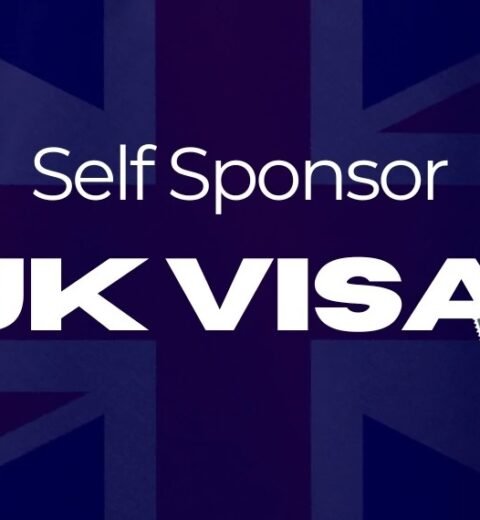Are you a Nigerian professional, freelancer, or entrepreneur looking to relocate to the UK but don’t have an employer to sponsor your visa? The UK Self-Sponsorship Visa could be your pathway to living and working in the UK on your own terms.
This visa allows individuals to sponsor themselves by setting up a UK-based business and using it as their visa sponsor. But how does it work? What are the benefits and risks? Here are seven frequently asked questions to help you understand this unique immigration route.
1️⃣ What Are the Eligibility Requirements?
To qualify for a self-sponsorship visa, you must:
✅ Register a UK Business – Your company must be legally registered with Companies House and comply with UK tax and employment laws.
✅ Obtain a Sponsor Licence – Your business must apply for a Skilled Worker Sponsor Licence from the Home Office. This licence allows your company to sponsor employees—including yourself.
✅ Meet the Skilled Worker Visa Criteria – Your role must match a job on the UK’s Skilled Occupation List, and you must meet the minimum salary requirement (usually £38,700 per year).
✅ Prove English Proficiency – You need to pass an approved English language test unless you have a degree taught in English.
✅ Demonstrate Financial Stability – You must show that your business can sustain itself and support your visa application.
2️⃣ What Are the Benefits of Self-Sponsorship?
Self-sponsorship comes with several advantages, including:
✔ Full Control Over Your Career – Unlike employer-sponsored visas, you won’t be tied to a single company. You can work for your own business, take on multiple projects, and expand your operations.
✔ Pathway to Permanent Residency – After five years on a Skilled Worker Visa, you can apply for Indefinite Leave to Remain (ILR), which leads to permanent residency in the UK.
✔ Freedom to Bring Family Members – Your spouse/partner and children under 18 can move with you and enjoy access to education, healthcare, and job opportunities.
3️⃣ Are There Risks or Challenges?
While self-sponsorship offers flexibility, it also comes with responsibilities and risks:
⚠ Compliance with UK Regulations – You must meet strict sponsor duties, including right-to-work checks and reporting changes to the Home Office. Failure to comply could result in your licence being revoked.
⚠ Business Sustainability – Since your visa depends on your business staying operational, any financial struggles could impact your ability to renew your visa.
⚠ Initial Costs & Paperwork – Setting up a business and applying for a sponsor licence involves legal fees, business planning, and comprehensive documentation.
4️⃣ How Long Does the Process Take?
The self-sponsorship process can take anywhere from 8 to 12 weeks, depending on:
⏳ How quickly you register your business and get a sponsor licence
⏳ Home Office processing times
⏳ Any additional document requests or delays
Tip: To avoid delays, make sure all documents are accurate and submitted correctly!
5️⃣ Can Self-Sponsorship Lead to Permanent Residency?
Yes! ✅ If you maintain your Skilled Worker Visa for five years, you can apply for Indefinite Leave to Remain (ILR). To qualify, you must:
🔹 Have continuously lived and worked in the UK under the Skilled Worker route
🔹 Meet the minimum salary requirement
🔹 Pass the Life in the UK Test and meet the English language requirement
Once you obtain ILR, you can live in the UK without immigration restrictions and later apply for British citizenship. 🇬🇧
6️⃣ Can I Bring My Family to the UK?
Yes! Your spouse/partner and children under 18 can join you in the UK as dependents. They will:
👨👩👧👦 Have the same visa length as you
🏥 Get access to the NHS (healthcare)
📚 Be able to work or study without restrictions
However, you must prove that you can financially support them without relying on public funds.
7️⃣ Do I Need a University Degree or Work Experience?
No formal degree is required, but you must demonstrate that:
✔ You have relevant skills, qualifications, or work experience for the role
✔ Your job meets the UK’s Skilled Worker criteria
✔ Your business can financially sustain itself
A strong professional background can help strengthen your case, even if you don’t have a university degree.
Final Thoughts 💭
The UK Self-Sponsorship Visa is a great option for Nigerians looking to build a career or business in the UK without employer dependency. However, it requires careful planning, business setup, and compliance with UK regulations.
If you’re serious about taking this route, consider seeking legal or immigration advice to ensure a smooth process.
👉 Would you like more updates on UK immigration pathways? Follow Naija UK Connect for expert insights tailored for Nigerians in the UK! 🇬🇧🇳🇬
Join Our WhatsApp Channel
Stay updated on the latest UK news, including education, health, job openings, and more for those living in the UK!
Join here: Naija UK Channel
Also, follow us on our social media channels for the latest updates and discussions:
- Twitter: @NaijaUKConnect
- Facebook: Naija UK Connect
- Instagram: @naijaukconnect




